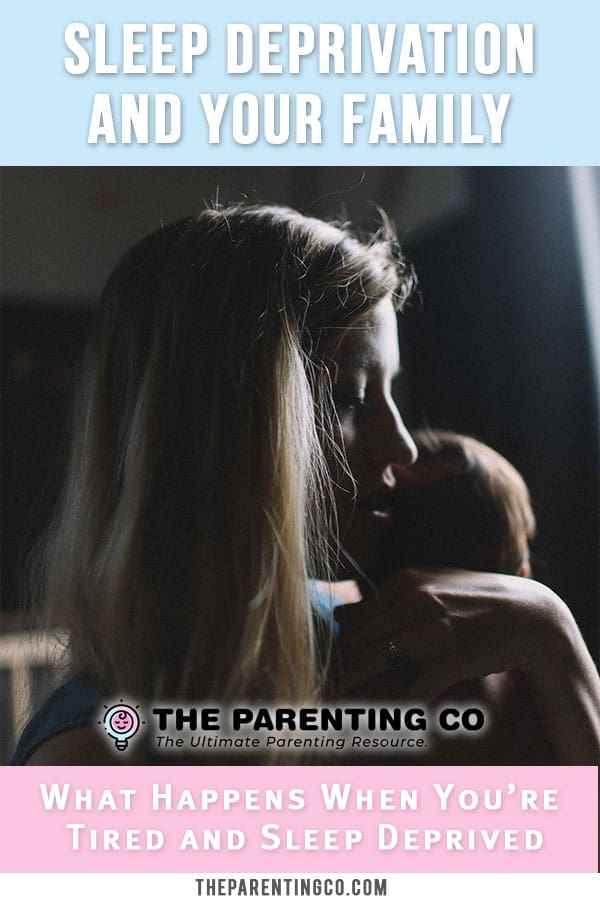It’s a given. Baby = Sleep Deprivation.
We all know it’s going to happen, and yet you can never really be prepared. Only other parents truly know and understand the draining depths of too little sleep on too many nights. You also don’t know the severity of your impending sleep deprivation until you meet your little bundle of joy. Some babies sleep through the night from 3 weeks of age, and some babies take months, even years, to get the hang of it. However, good sleeper or not, there will be tough nights ahead.
There are many jokes and memes on the topic because it’s better to laugh than cry. Right…
“Mothers are basically part of a science experiment to prove that sleep is not a crucial part of life.”
“Thanks for getting out of bed five times last night. Those three hours of sleep were all I needed. Said no mum ever.”
“People who say they slept like a baby usually don’t have one.”
According to the UK Sleep Survey, on average, parents have 34 hours less sleep than adults without children. They also found that parents with four children had 104 hours less sleep. Researchers at the University of Warwick found that sleep for parents and their satisfaction with sleep was reduced for 6 YEARS after the birth of their child. Another study also found that parents were averaging 3 to 4 hours of sleep per night, which is significantly less than the recommended 8 hours a night.
We know it’s going to happen to some degree.
We need to work out how to best manage the impending loss of sleep so we can still function at our best.
Sleep is such an interesting topic since the amount of sleep we need ranges from person to person, and it changes as we grow and mature. I love to sleep. I need a good 8 hours to function at my best and not decimate my husband with withering looks. He, on the other hand, could probably cope fairly happily on 5 hours for quite a few months before turning into my worst nightmare. He knew this too. Armed with this knowledge, he volunteered to take on the night feeds when our boys were newborns.
Here’s how our newborn night schedule looked.
As the boys were premature and had a low birth weight, we were on a strict 3 hour night feeding schedule for months.
| 7 pm | Both of us fed the boys and put them to bed. |
| 8/9 pm | Pump milk, and then on to bed for me. This way, I got two 4-hour stretches of sleep. |
| 10 pm | Laurence fed the boys and put them back to bed. He’d stay up and watch TV. |
| 12 am | I would wake up to pump. It took 15 minutes, and then I was back asleep. I would leave the milk on the bedside table, and Laurence would collect and put it in the fridge so that I just had to pump and go back to sleep. |
| 1 am | Laurence fed the boys and then went to bed. |
| 4 am | I fed the boys, put them back to sleep, and had a little nap too. |
| 7 am | I fed the boys, and we got up for the day. |
| 10 am | I fed the boys, and Laurence woke up for the day sometimes after this feed. |
This schedule worked well as we both got good stretches of sleep, and the boys were still getting their 3-hourly feeds overnight. We worked out the times that would better suit us. You need this when you’re trying to find reasons why your baby won’t sleep and what to do about it.
However, I’ll be honest.
At first, I was not happy with this arrangement. To the point that I would get up, interrupt Laurence, and say I should be doing it. He told me not to be silly and go back to bed and sleep. For a few nights, I went back to bed, fuming.
How dare he!
How dare he take my job. I’m the MUM, and I’m supposed to be up all night feeding. This was my job, my right, my sleep-deprived badge of honour.
Then, I realised how utterly ridiculous I was acting. Where did I get this idea—that to be a good mother, I needed to be up all night and sleep-deprived? It was foolish, and I was finally able to realise the wonderful and exceptional gift of sleep my husband gave to me in those first few months.
However, I would get my time.
When we were able to start weaning the boys from night feeds, it mostly fell to me. However, by that stage, we had such a great routine going, and the boys were already sleeping so well that I don’t remember it being that bad. Of course some nights were worse than others, but on the whole, it was okay. It had also been okay because I entered the wonderful world of
and was obsessed with teaching my boys to be good sleepers, and to this day, they are.
I didn’t want that sleep deprivation badge of honour. I wanted to be happy, energetic, and cheerful with my boys during the day. At the same time, I wanted the boys to be happy, energetic, and cheerful. This meant having enough sleep. It’s essential to our daily lives, we cannot live without it, and when we do, the effects are serious.
How Does Sleep Affects Mums and Dads
Sleep for mums starts to wane even before the baby arrived. Bladders being squished, making for many bathroom trips, and a burgeoning tummy makes getting comfortable a challenge. Then you try to organize a newborn sleep timeline. Some mothers report insomnia during pregnancy, as well. It just seems a little unfair. Although perhaps our bodies are just reading us for the coming months.
Studies have shown both mums and dads are affected by sleep deprivation. A study in the US demonstrated that new mums lose an average of 41 minutes of sleep per night. This surprised me. I felt like it would have been more. However, we need to consider sleep quality and length as broken sleep is not as restorative as long deep sleep. Mums were also able to gain another 30 minutes during the day from napping. Dads lost 18 minutes of sleep per night but were generally not able to make up any lost sleep with napping. Both parents report feelings of fatigue during the day.

What Happens When You’re Tired and Sleep Deprived
Mood Changes
Sleep has a significant effect on your mood. The effects of sleep deprivation on mood have been studied extensively, and links have been found between poor mood and a lack of sleep. The amygdala is the emotional centre of the brain. When the body is sleep-deprived, the amygdala is not functioning at its best. It provides a heightened response to your everyday circumstances. A study in Tel-Aviv found that when sleep-deprived, we lose our ability to be neutral, everything is heightened with even one night of sleep loss.
Memory Loss
When you are sleeping, your body is processing the information you learned that day and storing memories. Not getting enough sleep affects your ability to retain and remember new information.
Weakened Immunity
When you are sleeping your body is building and strengthening your immunity. When you don’t get enough sleep, your body is not able to sufficiently produce antibodies. This situation means you are more likely to get sick, and when you do get sick, it will be harder for your body to fight the sickness.
Risk of Diabetes
There is a link between a lack of sleep and Type 2 diabetes. When you are not getting enough sleep, your hormones are a bit all over the place. For example, when you lack sleep, your body produces less insulin (the hormone that helps regulate blood sugar) and more cortisol. The more cortisol is present in your system, the harder it is for insulin to regulate blood sugar in your body.
Low Sex Drive
Being too tired for sex is a pretty common complaint with new parents. You’re going to hate me for this, and I almost hate myself for writing it. But, sex before bedtime helps you feel better and sleep better. Studies have shown that the more you sleep, the higher is your sex drive.
Trouble Concentrating and Thinking
Researchers found that when you are tired, neurons in the brain send signals at a slower speed. This means your ability to react, to reason, and to make decisions is impaired.
Poor Balance and a Higher Risk of Accidents
This effect of sleep deprivation comes alongside troubles with concentrating and thinking. Your brain is sending out signals to your body slower than usual. It means that your ability to move and react is slower, which can cause more accidents.
Feeling Fatigued
This one is self-explanatory. When we don’t get enough sleep, we don’t have sufficient energy to get through the day.
Feeling Depressed and Anxious
From many studies it would seem that mental illness and sleep of a lack of sleep go hand in hand. A study on new mothers found that chances of depression in women with poor sleep were 3.34 times higher than women who were sleeping well. Sleep deprivation has been shown to worsen the symptoms of PPD.
Lack of Motivation
Lack of sleep makes focusing and concentrating difficult. When you are having trouble concentrating and focusing, it is hard to define and work towards the goals that you have made.
Increased Cravings and Weight Gain
When you are tired, your body releases larger amounts of the hormone ghrelin, which is the hunger hormone. In turn, your body releases less leptin, which is the satiety hormone. This situation means when you are tired, you are more hungry and less quickly satisfied. Often, this brings cravings for high-calorie and sweet foods which trigger a reward in the brain. This is one reason it might be a struggle to shift the last of the baby weight.
How to Tell the Difference Between Sleep Deprivation and PPD:
- Your mood doesn’t improve even with extra sleep or help and you start questioning if you were even ready to be a parent in the first place.
- Attachment to your baby – Even sleep-deprived parents report a feeling of closeness with their child. However, difficult bonding or attaching to your baby is a sign of PPD.
- You still have a good time and enjoy hobbies and activities when sleep deprived. PPD spells a loss of interest and enthusiasm across the board.
Sleep Deprivation and Partner Relations
According to one study, 59% of new parents said that sleep deprivation led to more arguments with their partner. We know that as we experience sleep deprivation, we lose our neutrality, and our amygdala response is heightened. Without adequate sleep, we aren’t able to control our emotions well, or they feel bigger and more complicated than usual.
Remember, sleep deprivation is used as a means of torture.
This situation is bound to take a toll on parental relationships. Add financial pressures of a new baby to sleep deprivation, and it’s no wonder that marital bliss is fading quickly. It’s easy to see why there is more bickering, why there are more moody glances, why each partner resents the other. A study of 35 couples found that when women don’t sleep well, it affected their relations the next day. Women are also more likely to express their stress and exhaustion, create an emotional environment, which consequently sparked more negative encounters.
Ways to Love Your Partner Even When You Are Both Tired:
- Work out how to manage the nights so that everyone gets a good stretch of sleep.
- Go on a date once a week. Get dressed and get out of the house, even if you don’t feel like it. This one-on-one connection time is so important.
- Hire a sleep consultant.
- Hire a night nanny.
- Ask the grandparents or aunts and uncles to come over for a few nights and take the night shift while you get some sleep.
- Express how you feel and acknowledge your partner’s tired levels.
- Understand that it’s not you, it’s not him, it’s not the baby. It’s the moment, the current situation, and it won’t last forever.
Sleep Debt
Sleep debt is the amount of sleep needs we don’t meet. It continues to grow with a continued lack of sleep, and we can reduce it with more sleep. For women, this sleep debt can begin building in pregnancy. A burgeoning belly, squashed bladder, pregnancy insomnia, reflux, and just not being able to get comfortable means that broken sleep can already be the norm for a mum. And that happens during pregnancy, even before the baby arrives. Make sure you work out times you can pay your sleep debt back.
It’s not all doom and gloom, though.
Things That Can Help With Sleep Deprivation
First, remember that a certain amount of sleep deprivation is normal and something you can expect during the first few months. However, don’t forget that sleep is important. I love to tell my clients that they should prioritise sleep for themselves and their baby as much as food.
Sleep When the Baby Sleeps
I know, I know. It is the most common form of advice and to be honest, not very helpful. It’s not always easy to sleep when your baby sleeps. Maybe you’re feeling a little anxious, and you can’t stop thinking about the dishes that need washing and the clothes that need hanging outside to dry. Whatever the reasons, it can be challenging to get some shut-eye when the baby does. However, just lie down with your eyes closed and relaxed. Even if you don’t reach sleep, studies have shown that your body will still get some rest.
Meditate
If you have never meditated before, you can start now. Listen to guided meditations on YouTube. They are very calming and relaxing and can often help you to fall asleep.
Paternity Leave
Find out what paternity options your partner has. Many workplaces offer a few weeks of paternity leave for dads. Having some extra hands for even a few weeks might just make everything that bit easier.
Ask for and Accept Help
Ask Grandma or Aunty over for a night a week. Even if you are breastfeeding, you can still use a bottle of expressed milk. Let them take 1 or 2 feeds so you can get a bit of sleep. However, if you enjoy the quiet middle of the night feeds which I’ve heard many mums do, then ask Granny to take a day feed and let you sleep in, or the afternoon feed while you have an extra nap.
Limit TV Time
TV Time is our go-to relaxation time, but the blue and green lights from the television and other screens around your home can inhibit your ability to sleep. The light inhibits and prevents the release of melatonin, your body’s sleep hormone.
Say No
Say no to guests. Don’t add extra pressure by feeling as though you need to be a perfect hostess. Tell them, ‘no, I need to take a nap this afternoon.’ Then arrange a time that will work for you. Maybe at the park or a coffee shop so that you don’t feel any pressure about cleaning the house.
Sleep Plan
Work out a plan with your partner. He can take the 10 pm dream feed. Meanwhile, you can go to bed at 7 pm and get a good stretch of sleep before the baby wakes around 2/3 am. On the weekends, let dad take the morning shift. He can get your baby up and changed, bring the baby to you in bed for a feed, and then take your baby to play or eat breakfast while you get some extra sleep.
Let Your Partner Help
As mothers, especially new mothers, we can be tempted and feel like we have to take every aspect of our baby’s care and sleep on ourselves. Let dad in and let him have some one-on-one time too. Not only do you need the rest, but dad and baby need that alone bonding time, as well.
Good Quality Breast Pump
A quality breast pump is essential to mothers today. It takes the pressure off having to give your baby every feed. It allows you to leave the house and get a break, allowing other members of your family to delight in feeding your baby and enjoy that special bonding time.
As a society, we have become very closed off from community. There has been a rise in PPD, PPA, and mothers not coping with the demands of motherhood and modern life. There has been this message that we should be able to do it all ourselves. This message could not be more wrong.
I love the stories I hear of other cultures who dote on their new mothers. The community can help them around their house and with cooking so the new mother can just focus on healing from the birth, feeding the baby, and sleeping. I would urge you to learn to accept help even if you don’t think you need it. Your sleep is vital to your wellbeing and the wellbeing of your family.



